|
|
|
Sort Order |
|
|
|
Items / Page
|
|
|
|
|
|
|
| Srl | Item |
| 1 |
ID:
148070
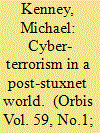

|
|
|
|
|
| Summary/Abstract |
Recent cyber-attacks such as Stuxnet and Anonymous’ increasingly aggressive digital activism have rekindled fears that cyber-terrorism is an imminent threat. However, the concept remains poorly understood. Confusion over cyber-terrorism stems, in part, from recent attempts to stretch the concept to include hacktivism and terrorists’ use of the Internet to facilitate conventional terrorism. Although the United States and other countries have experienced thousands of cyberattacks in recent years, none have risen to the level of cyber-terrorism. This article seeks to dial down the rhetoric on cyber-terrorism by explaining how it differs from cyber-attacks, cyber-warfare, hacktivism, and terrorists’ use of the Internet. The most immediate online threat from non-state terrorists lies in their ability to exploit the Internet to raise funds, research targets, and recruit supporters rather than engage in cyber-terrorism. Cyber-terrorism may well occur in the future, but for now online crime, hacktivism, and cyber-warfare are more pressing virtual dangers.
|
|
|
|
|
|
|
|
|
|
|
|
|
|
|
|
| 2 |
ID:
137231
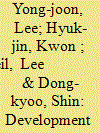

|
|
|
|
|
| Summary/Abstract |
This paper intends to propose countermeasures against increasingly sophisticated North Korean cyberterrorism through analysis of the cyber attack carried out by North Korea on March 20, 2013, which targeted South Korea’s major television stations and financial institutions, and also the attack of June 25, 2013, which was directed at South Korea’s government. These cyber attacks not only caused South Korea’s major television stations and banks to suffer from frozen computer terminals,
but also paralyzed websites including those belonging to the Presidential Office, the Prime Minister’s Office, government institutions and local media companies. This article addresses, firstly, the reasons why cyber attacks are now targeting the websites of media companies and financial institutions, whereas in the past they were intended to paralyze the national government by means of DDoS attacks. Secondly, the article attempts to predict the kinds of attack that can be expected in the future. Thirdly, in order to ensure that there are sound defenses against the continually growing threat of cyber terrorism, the article proposes an optimal system of countermeasures, describing related regulations, response strategies, and security personnel.
|
|
|
|
|
|
|
|
|
|
|
|
|
|
|
|
| 3 |
ID:
134052
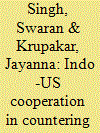

|
|
|
|
|
| Publication |
2014.
|
| Summary/Abstract |
The increasing dependence on Information and Communication Technologies (ICTs) has unleashed a whole new genre of cyber terrorism. Cyber attacks on critical infrastructure, online hate propaganda and use of the internet for recruiting, planning and effecting terrorist attacks have become new frontiers of terrorism. The ubiquitous cyberspace has expanded terrorism structures and transformed their operations. Given their democratic traditions of privileging basic freedoms, such as individual privacy, and the unprecedented spread of the internet, India and the US face a formidable challenge in confronting cyber terrorism. While both countries share a strong political affinity to cooperate and have set up institutional mechanisms to secure cyberspace, divergences in their approaches and a lack of clarity and consensus on their immediate and long-term goals continue to be their fundamental limitations. In spite of their strong commitment to work together, their divergent approaches to internet governance and episodes like the WikiLeaks and Snowden affairs have only re-enforced their continuing trust deficit.
|
|
|
|
|
|
|
|
|
|
|
|
|
|
|
|
| 4 |
ID:
068054
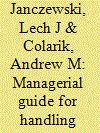

|
|
|
|
|
| Publication |
Hershey, Idea Group Publishing, 2005.
|
| Description |
xiv, 229p.Hbk
|
| Standard Number |
1591405831
|
|
|
|
|
|
|
|
|
|
|
|
Copies: C:1/I:0,R:0,Q:0
Circulation
| Accession# | Call# | Current Location | Status | Policy | Location |
| 050939 | 658.478/JAN 050939 | Main | On Shelf | General | |
|
|
|
|
| 5 |
ID:
058274
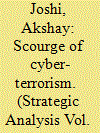

|
|
|
|
|
|
|
|